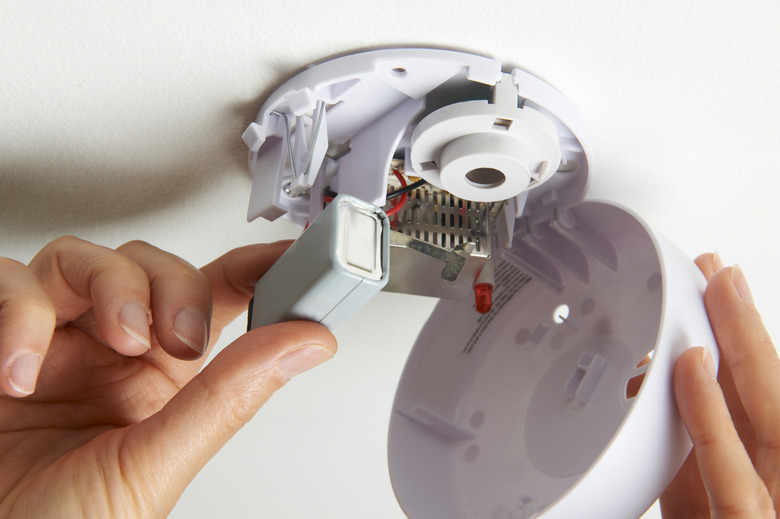Do Hardwired Smoke Detectors Have Batteries?
The hardwired smoke detectors attached to your home's electrical system have backup batteries to sound the alarm even if the power goes out. You do need to change the batteries when the unit indicates that they are low on power to ensure continuous protection from smoke and fires. Knowing that you have a system of smoke detectors throughout the house provides peace of mind as well as protection for yourself and your family.
Tip
Smoke detectors that are hardwired into a home's electrical system have backup batteries. If there is a smoldering fire or active flames and the house has lost power, the unit will still sound the alarm.
Types of Smoke Detectors
Smoke detectors, both wired and battery-operated, are available in two primary types: photoelectric or ionization. A photoelectric or smoke alarm will detect a smoldering fire. Ionization or heat alarms respond better to active flames.
A third type of hardwired smoke detector is a combination detector. It can detect carbon monoxide as well as smoke and flames. These alarms can also be interconnected with other smoke detectors to provide whole-house coverage.
Positive Aspects of Hardwired Units
Hardwired smoke detectors are not only a speedy warning to get out of the house when a fire starts but they are often interconnected. When one alarm goes off, they all sound. If you're in the basement and a fire starts in the attic, you'll still have a loud and persistent alarm warning you to get yourself and the family outside before becoming a tragic statistic.
While many hardwired smoke detectors use the electrical wires in the house to maintain contact with each other, modern hardwired units can be interconnected wirelessly. In addition, some units have lights to alert hearing-impaired residents, and others provide voice and location alerts. Not only does the unit warn you of the smoke and fire but it also tells you the type of alert and where it is in the house. With this information, you can choose the safest evacuation route.
The Detector Keeps Chirping
While hardwired units are the best choice for most homeowners, they sometimes begin an intermittent but incessant chirping. If the backup battery needs replacement, only the affected unit will chirp. Simply remove and replace the battery unless it is a smoke detector with a sealed 10-year battery, in which case you'll have to replace the entire unit. It's usually a good idea to replace all the backup batteries at the same time since they're likely to start failing one by one and usually at the most inconvenient times.
If the power has just come on after a storm, your smoke detector's microprocessor may not have cleared. First, check the breaker box; if the circuit breaker tripped, it may be as simple as flipping it back on. Next, try holding down the "test" or "reset" button on the smoke detector for 15 to 20 seconds or until the alarm sounds. Release the button and if the chirping stops, you've fixed the problem.
If the chirping doesn't stop, you must manually clear the processor. Turn off the power by switching off the circuit breaker for the alarm circuit in your home's breaker box. Remove the alarm from its mounting plate, and disconnect it from its wiring harness. Remove the battery and press the reset button for 15 to 20 seconds. Reinstall the battery and the smoke detector before turning the power back on.
Smoke Detector Life Span
Smoke detectors are only good for seven to 10 years. At that point, they need to be replaced. Depending on the manufacturer, your unit may beep five times in rapid succession, pause for a minute and repeat.
Turn off the power, remove the smoke detector and replace it with the new detector before restoring the power. Don't forget to pull out the battery tab or the unit will beep until the backup battery is properly installed. In addition, make sure the cover or battery tray is fully closed or the unit may keep beeping.
